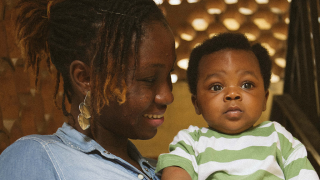2022 World Malaria Report: The malaria fight is off track
"The findings of WHO’s 2022 World Malaria Report are a sharp reminder that, despite some stabilisation of deaths and cases, they remain at an unacceptably high level post pandemic. This news is disheartening given the progress made over the last decade and we are now facing a narrowing window of opportunity to get back on track." – Gareth Jenkins, Interim CEO, Malaria No More UK
The World Health Organisation's 2022 World Malaria Report again highlights the tragic reality that without investment, a preventable and treatable disease will continue to destroy livelihoods, weaken already fragile health systems, and claim the life of a child every minute.
The continued efforts and resilience of endemic countries has meant deaths and cases have largely stabilised. Malaria cases continued to rise between 2020 and 2021, but at a slower rate than in the period 2019 to 2020. However, we have not seen significant progress to get back on track towards meeting vital SDG targets, reflecting in part the impact of COVID-19 on malaria programming and infrastructure.
Global malaria deaths, mostly impacting young children and pregnant women, fell slightly in 2021 but remain at more than half a million every year and have still not recovered to pre-pandemic levels. These latest findings demonstrate that – now more than ever – we need renewed momentum around sustainable funding, strong leadership, and political will in the fight against one of the world’s oldest and deadliest enemies.

2022 World Malaria Report: What you need to know
- Malaria cases continued to rise between 2020 and 2021, although at a slower rate than between 2020 and 2021. There were 247 million cases in 2021 compared to 245 million in 2020 and 232 million in 2019
- 619,000 people lost their lives to malaria in 2021, a slight decrease from the 625,000 in 2020, but still above 2019 levels (568,000 deaths)
- The impacts of COVID-19 continued to be felt, as 63,000 additional malaria deaths and 13 million malaria cases were attributed to COVID-related disruptions in 2020 and 2021.
- An estimated 185 million malaria cases were prevented and almost a million lives were saved in 2021.
- 35 malaria endemic countries recorded fewer than 1,000 malaria cases, and five of the highest burden countries recorded a decline in deaths.[MH2]
The UK needs to renew its strong leadership
It’s not too late for the UK to help to turn the tide in this fight so we can end malaria in a generation.
"Britain has a long and proud history in the fight against malaria, with British investment and scientific leadership reliably delivered over decades. If we want to change the trajectory evident from the last two World Malaria Reports, and increase our preparedness to fight future pandemics, it is vital that the UK continues to play this role, investing in British science and funding institutions like the Global Fund to Fight AIDS, Tuberculosis and Malaria that save millions of lives." – Gareth Jenkins, Interim CEO, Malaria No More UK
The UK has historically been at the forefront of demonstrating the leadership and developing the tools required to accelerate the fight against malaria.
In his recent speech to the CBI Conference, Rishi Sunak described innovation as a "defining focus of this government", so we now urge the Prime Minister to turn these words into action by demonstrating strong support for the British innovation pipeline – including vaccines, drugs, and new generation nets – as well as the mechanisms, such as the Global Fund, that ensure these tools get to the right people, in the right places, at the right time.
Investing in UK science and innovation will help us to play a major role in helping to eradicate malaria across the globe and contribute to our own health security






